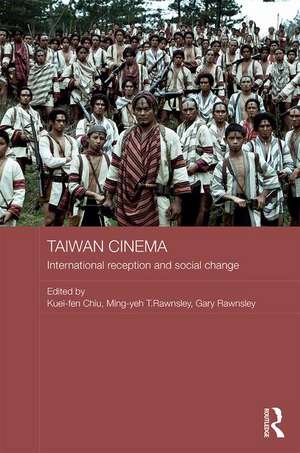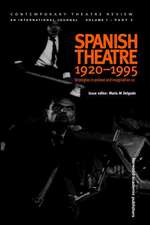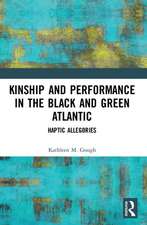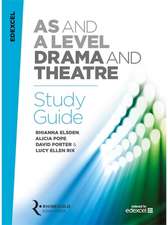Taiwan Cinema: International Reception and Social Change: Media, Culture and Social Change in Asia
Editat de Kuei-fen Chiu, Ming-yeh Rawnsley, Gary Rawnsleyen Limba Engleză Hardback – 13 iun 2017
| Toate formatele și edițiile | Preț | Express |
|---|---|---|
| Paperback (1) | 385.47 lei 6-8 săpt. | |
| Taylor & Francis – 12 dec 2019 | 385.47 lei 6-8 săpt. | |
| Hardback (1) | 1169.45 lei 6-8 săpt. | |
| Taylor & Francis – 13 iun 2017 | 1169.45 lei 6-8 săpt. |
Din seria Media, Culture and Social Change in Asia
-
 Preț: 378.83 lei
Preț: 378.83 lei -
 Preț: 329.94 lei
Preț: 329.94 lei -
 Preț: 297.40 lei
Preț: 297.40 lei -
 Preț: 364.22 lei
Preț: 364.22 lei - 18%
 Preț: 1276.52 lei
Preț: 1276.52 lei - 28%
 Preț: 820.73 lei
Preț: 820.73 lei -
 Preț: 367.83 lei
Preț: 367.83 lei - 18%
 Preț: 1272.58 lei
Preț: 1272.58 lei - 18%
 Preț: 1220.31 lei
Preț: 1220.31 lei -
 Preț: 487.47 lei
Preț: 487.47 lei - 18%
 Preț: 1162.84 lei
Preț: 1162.84 lei -
 Preț: 383.63 lei
Preț: 383.63 lei - 18%
 Preț: 1167.71 lei
Preț: 1167.71 lei -
 Preț: 415.24 lei
Preț: 415.24 lei - 18%
 Preț: 703.45 lei
Preț: 703.45 lei - 26%
 Preț: 874.74 lei
Preț: 874.74 lei - 18%
 Preț: 1054.27 lei
Preț: 1054.27 lei -
 Preț: 459.71 lei
Preț: 459.71 lei - 18%
 Preț: 1003.43 lei
Preț: 1003.43 lei - 11%
 Preț: 323.91 lei
Preț: 323.91 lei -
 Preț: 383.63 lei
Preț: 383.63 lei - 15%
 Preț: 426.77 lei
Preț: 426.77 lei - 18%
 Preț: 1059.84 lei
Preț: 1059.84 lei - 18%
 Preț: 1058.43 lei
Preț: 1058.43 lei -
 Preț: 412.19 lei
Preț: 412.19 lei - 18%
 Preț: 1057.75 lei
Preț: 1057.75 lei - 18%
 Preț: 1164.92 lei
Preț: 1164.92 lei - 18%
 Preț: 1219.72 lei
Preț: 1219.72 lei - 18%
 Preț: 1054.75 lei
Preț: 1054.75 lei - 18%
 Preț: 1108.73 lei
Preț: 1108.73 lei -
 Preț: 402.13 lei
Preț: 402.13 lei - 18%
 Preț: 1219.72 lei
Preț: 1219.72 lei -
 Preț: 408.74 lei
Preț: 408.74 lei - 18%
 Preț: 1216.52 lei
Preț: 1216.52 lei - 26%
 Preț: 846.09 lei
Preț: 846.09 lei - 18%
 Preț: 1270.19 lei
Preț: 1270.19 lei - 18%
 Preț: 1219.65 lei
Preț: 1219.65 lei -
 Preț: 409.69 lei
Preț: 409.69 lei - 18%
 Preț: 1166.17 lei
Preț: 1166.17 lei
Preț: 1169.45 lei
Preț vechi: 1426.15 lei
-18% Nou
Puncte Express: 1754
Preț estimativ în valută:
223.84€ • 243.23$ • 188.15£
223.84€ • 243.23$ • 188.15£
Carte tipărită la comandă
Livrare economică 21 aprilie-05 mai
Preluare comenzi: 021 569.72.76
Specificații
ISBN-13: 9781138668164
ISBN-10: 1138668168
Pagini: 246
Ilustrații: 15 Halftones, black and white; 1 Tables, black and white
Dimensiuni: 156 x 234 x 16 mm
Greutate: 0.62 kg
Ediția:1
Editura: Taylor & Francis
Colecția Routledge
Seria Media, Culture and Social Change in Asia
Locul publicării:Oxford, United Kingdom
ISBN-10: 1138668168
Pagini: 246
Ilustrații: 15 Halftones, black and white; 1 Tables, black and white
Dimensiuni: 156 x 234 x 16 mm
Greutate: 0.62 kg
Ediția:1
Editura: Taylor & Francis
Colecția Routledge
Seria Media, Culture and Social Change in Asia
Locul publicării:Oxford, United Kingdom
Cuprins
1. From Taiwan New Cinema to Post-New Cinema: An Introduction, Kuei-fen Chiu
Part I: International Reception and Taiwan Cinema
2. Taiwan Cinema across the Globe: A Brazilian Perspective
3. Variables of Transnational Authorship: Hou Hsiao-hsien and Wei Te-sheng
4. Taiwan Cinema at the Venice Film Festival: From Cultural Discovery to Cultural Diplomacy
5. Contesting the National, Labelling the Renaissance: Exhibiting Taiwan Cinema at Film Festivals in Japan since the 1980s
6. Programming Taiwan Cinema: A View from the International Film Festival Circuit
7. Interventions on Cultural Margins: The Case of the Chinese Film Forum UK and the Presence of Taiwan Cinema in the UK
Part II: Taiwan Cinema and Social Change
8. Becoming a Nation: The Shaping of Taiwan’s Native Consciousness in Wei Te-sheng’s Post-Millennium Films
9. Imagine There’s No China: Wei Te-sheng and Taiwan’s ‘Japan Complex’
10. Kano and Taiwanese Baseball: Playing with Transregionality and Postcoloniality
11. Seediq Bale as History
12. Violence and Indigenous Visual History: Interventional Historiography in Seediq Bale and Wushe, Chuanzhong Island
13. Archiving an Historical Incident: The Making of Seediq Bale as a Socio-Political Event
14. Mona Rudao’s Scar: Two Kinds of Epic Identity in Seediq Bale
Part III: Interview and Supplement
15. A Conversation with Taiwanese Filmmaker Wei Te-sheng
Part I: International Reception and Taiwan Cinema
2. Taiwan Cinema across the Globe: A Brazilian Perspective
3. Variables of Transnational Authorship: Hou Hsiao-hsien and Wei Te-sheng
4. Taiwan Cinema at the Venice Film Festival: From Cultural Discovery to Cultural Diplomacy
5. Contesting the National, Labelling the Renaissance: Exhibiting Taiwan Cinema at Film Festivals in Japan since the 1980s
6. Programming Taiwan Cinema: A View from the International Film Festival Circuit
7. Interventions on Cultural Margins: The Case of the Chinese Film Forum UK and the Presence of Taiwan Cinema in the UK
Part II: Taiwan Cinema and Social Change
8. Becoming a Nation: The Shaping of Taiwan’s Native Consciousness in Wei Te-sheng’s Post-Millennium Films
9. Imagine There’s No China: Wei Te-sheng and Taiwan’s ‘Japan Complex’
10. Kano and Taiwanese Baseball: Playing with Transregionality and Postcoloniality
11. Seediq Bale as History
12. Violence and Indigenous Visual History: Interventional Historiography in Seediq Bale and Wushe, Chuanzhong Island
13. Archiving an Historical Incident: The Making of Seediq Bale as a Socio-Political Event
14. Mona Rudao’s Scar: Two Kinds of Epic Identity in Seediq Bale
Part III: Interview and Supplement
15. A Conversation with Taiwanese Filmmaker Wei Te-sheng
Notă biografică
Kuei-fen Chiu is Professor of Taiwan Literature and Transnational Cultural Studies at National Chung Hsing University, Taiwan.
Ming-yeh T. Rawnsley is a Research Associate in the Centre of Taiwan Studies at the School of Oriental and African Studies, University of London, UK.
Gary Rawnsley is Professor of Public Diplomacy in the Department of International Politics at Aberystwyth University, UK.
Ming-yeh T. Rawnsley is a Research Associate in the Centre of Taiwan Studies at the School of Oriental and African Studies, University of London, UK.
Gary Rawnsley is Professor of Public Diplomacy in the Department of International Politics at Aberystwyth University, UK.
Descriere
The book examines recent developments in Taiwan cinema, with partiuclar focus on a leading contemporary Taiwan filmmaker, Wei Te-sheng, who is responsible for such Asian blockbusters as Cape No.7, Warriors of the Rainbow: Seediq Bale and Kano. The book discusses key issues, including: why (until about 2008) Taiwan cinema underwent a decline, and how cinema is portraying current social changes in Taiwan, including changing youth culture and how it represents indigenous people in the historical narrative of Taiwan. The book also explores the reasons why current Taiwan cinema is receiving a much less enthusiastic response globally compared to its reception in previous decades.













